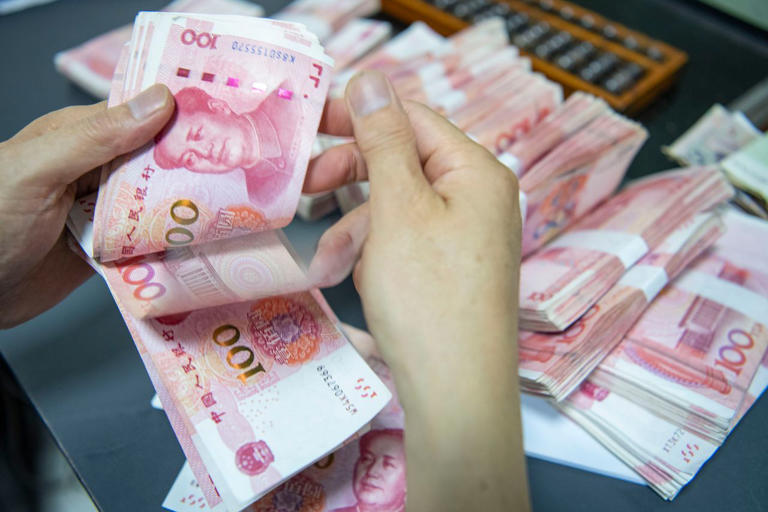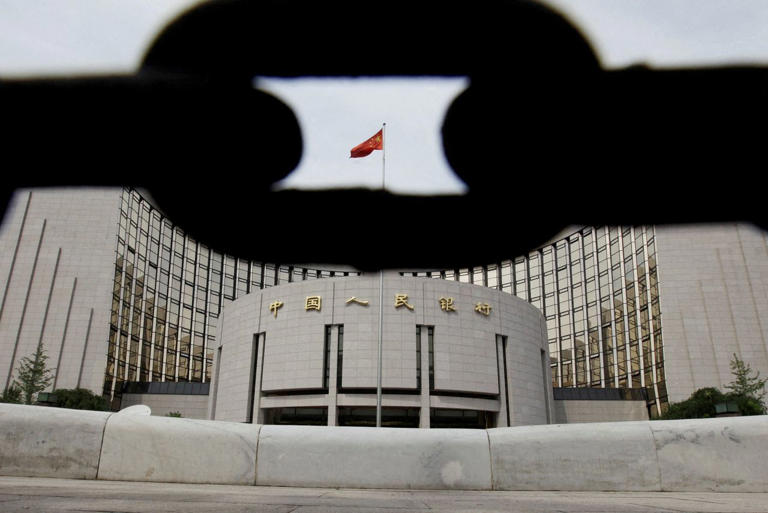Foreign Firms Pull Billions in Earnings Out of China
The Wall Street Journal

SINGAPORE—For years, foreign companies plowed the profits they made in China back into China, using the cash to finance new hiring and investment as its giant economy expanded rapidly.
Now, as growth slows and tensions between Beijing and Washington rise, they are pulling those profits out.
Foreign firms yanked more than $160 billion in total earnings from China during six successive quarters through the end of September, according to an analysis of Chinese data, an unusually sustained run of profit outflows that shows how much the country’s appeal is waning for foreign capital. The torrent of earnings leaving China pushed overall foreign direct investment in the world’s second-largest economy into the red in the third quarter for the first time in a quarter of a century.
The outflows add to pressure on China’s currency, the yuan, when the country’s central bank is already battling to slow its decline as investors sour on Chinese stocks and bonds and new investment in China is scarce. The yuan has depreciated 5.7% against the U.S. dollar this year and touched its lowest level in more than a decade in September.
A range of factors have contributed to the profit exodus, economists and corporate executives say. Those include a widening gap between China’s interest rates and those in the U.S. and Europe that has made it more attractive to park earnings in the West. While the Fed and other central banks have been raising rates to fight inflation, China has been cutting them as policy makers battle a prolonged downturn in its real-estate market.
Related video: Chinese Premier Li Vows to Boost Imports, Expand Market Access (Bloomberg)Duration 2:18 View on Watch
But many foreign firms are looking for better uses for their money, as China’s economy slows and geopolitical tensions rise. Chilly relations between Beijing and the U.S.-led West have pushed global companies to rethink their supply chains and exposure to China.
“Corporates are beginning to de-risk from China,” said Peter Kinsella, global head of foreign-exchange strategy at Union Bancaire Privé.
Firan Technology Group, an aerospace electronics company based in Toronto, pulled around 2.2 million Canadian dollars, equivalent to $1.6 million, from China in 2022 and the first quarter of 2023, said Chief Executive Brad Bourne. The company invested between eight million and 10 million Canadian dollars to expand its business in China over the past decade.
The main reason for withdrawing cash from China was to help finance two recent acquisitions in the U.S., Bourne said. But he added that deteriorating ties between Washington and Beijing are a concern for the company. “For sure, there are more uncertainties as to what will happen regarding tensions between China and the West/U.S.,” he said. “So having large sums of money there has some risk.”
Unlike most other major economies, China doesn’t distinguish between reinvested profits and new or “greenfield” foreign investment in its balance of payments, a record of a country’s international transactions.
China’s Ministry of Commerce, however, does publish monthly data on greenfield investment. By subtracting those data from the direct investment sums recorded in China’s balance of payments, economists can get a rough estimate of the flow of profits being reinvested in China or being pulled back overseas.
The data show that for all but two quarters between 2014 and the middle of last year, foreign firms were reinvesting more in China than they were transferring abroad. In 2021, for instance, firms reinvested a net $170 billion.
That shifted in the middle of 2022, when China was under sporadic lockdowns and the U.S. Federal Reserve began raising interest rates to combat rocketing inflation. Outflows have continued in each quarter since.
“Could this be a canary in the coal mine for future investment intentions? It’s possible,” said Alex Etra, senior macro strategist at Exante Data, which tracks global capital flows.
Recent surveys of U.S., European and Japanese companies in China show executives are souring on new investments there, unnerved by the prospect of conflict with Taiwan and China’s efforts to tighten oversight of foreign firms operating within its borders. Overall foreign direct investment in China was negative in the third quarter, with outflows of capital exceeding inflows by $11.8 billion—the first negative quarterly outflow recorded in balance-of-payments data that starts in 1998
The U.S. has imposed restrictions on American investment in China in sensitive sectors such as artificial intelligence and has prohibited the export to China of high-end computer chips, fearing they could be used by its military.
China has imposed exit bans on certain employees of foreign companies and earlier this year raided the offices of some consulting firms providing services to multinational companies. The government has also broadened its anti-spying laws to counter perceived foreign threats in ways that could encompass routine corporate activities.
Some firms have disclosed that they are taking profits out of China, though without giving many details. Swiss materials-technology company Oerlikon said in February it pulled 250 million Swiss francs, equivalent to $276 million, from China in 2022. A spokeswoman described the transfer as routine, saying the company regularly moves cash between major markets.
Austrian engineering group Andritz, which makes machinery for the hydropower, paper and steel industries, said in July it chose to bring funds home from China this year to finance investments and acquisitions worldwide, though it didn’t say how much.
“In previous years, we made substantial investments in China to capitalize on the growing market opportunities in China and Southeast Asia. The returns from these successful investments will be utilized to fund future investments and further acquisitions within our group worldwide,” said a spokeswoman for Andritz.
The repatriation of companies’ earnings is part of a broader outflow of foreign capital from China as investors have soured on the country’s financial markets. Higher rates and bond yields in the U.S. have also made Chinese stocks and bonds far less attractive to global investors.
Foreign institutions have cut their holdings of yuan-denominated Chinese bonds by the equivalent of more than $110 billion since the start of 2022, after accumulating the securities for years. The exodus began the same month that Russia invaded Ukraine, and market participants have pointed to the geopolitical risks of investing in Chinese assets as a major reason.
Yields on Chinese government bonds last year also fell below comparable U.S. Treasury debt for the first time in more than a decade. That gap has since widened.
More recently, global investors have also become net sellers of stocks listed in mainland China. From August to October, they pulled more than $23 billion from yuan-denominated shares via a trading link between Hong Kong and stock exchanges in Shanghai and Shenzhen, according to data provider Wind.
These outflows have weighed on the yuan. The weaker currency has motivated companies to repatriate their earnings sooner rather than later, said Ju Wang, head of Greater China foreign-exchange and rates strategy at BNP Paribas.
“If anything, the outflow is driven by foreigners finding better investment opportunities elsewhere,” Wang said.

.jpg)




No comments:
Post a Comment